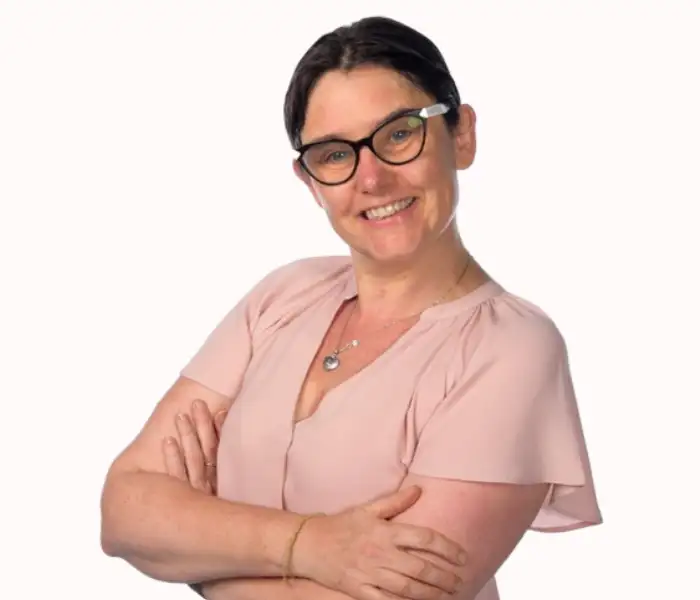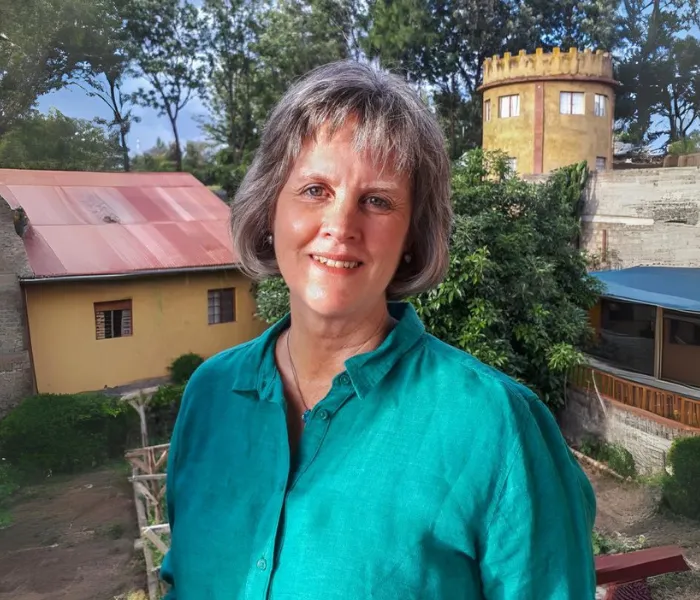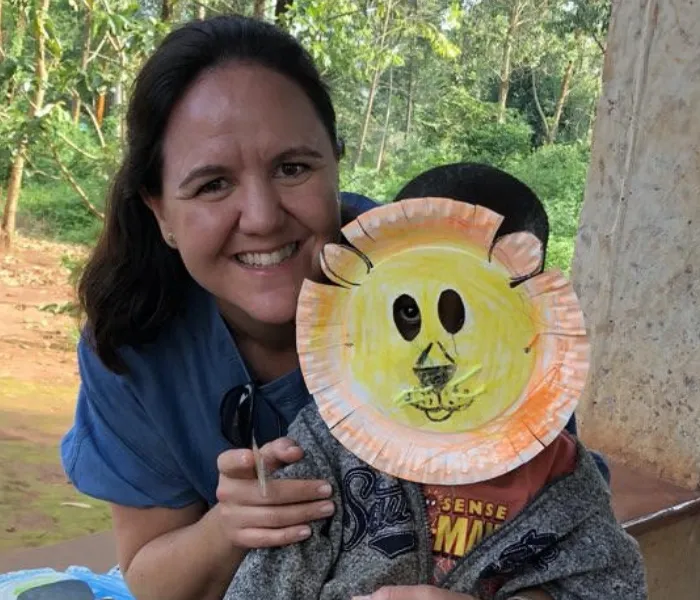Stephanie Evans – Masters in SEND and Inclusion | Certificate of Competence in Educational Testing | Psychology for Education | Social and Emotional Mental Health Needs
Stephanie Evans completed her Masters in SEND and Inclusion with us while she was a SENCO at Bangkok Patana School in Thailand. She has recently returned to the UK and is taking a career break to look after her young family.
After gaining her QTS in England, Stephanie moved to Thailand to become a Business Studies Teacher. She progressed to become Head of Sixth Form and took an interest in pastoral support. Shortly afterwards her Principal approached her and asked if she wanted to take up the role of school SENCo.
Stephanie realised that building her assessment skills would be an immediate requirement – when a gap in the team left them without a qualified assessor. She studied our CCET (Certificate of Competence in Educational Testing) module before going on to do our Access Arrangements Update course, Psychology for Education and Social and Emotional Mental Health Needs modules.
Her research project investigated whether offering the BTEC would be advantageous to pupils with SEND in the Sixth form as an alternative option to the current International Baccalaureate. As a result of her research, the school is rolling out several BTECs this coming year, providing students with more choice of study options..
Stephanie had the following to say about her overall learning experience with us:
“Studying with Real Training has helped my career and my professional development immensely. I haven’t found anything else that comes close and everyone I speak to has said the same. If you’ve done any level of special needs qualifications – it’s with Real Training.“ Stephanie Evans – SENCO, Bangkok Patana School
Of our CCET course Stephanie commented:
“This was a logical starting point for me, but what surprised me was just how much I enjoyed the course! It was very rewarding to be able to look at the numbers and pinpoint exactly where (and why) a student might be struggling. Often it meant I could sit down with students who told me “I’m just not clever” and show them the numbers that proved they actually were – they just need support in the right areas.“
You can find out more about what she thought about gaining her master’s by watching the video below.
Nick Wilding – MEd SEND
Nick Wilding is the Head of Student Support Services at an international school in Vietnam. Beginning his studies with Real Training in 2017, Nick embarked on our National Award for SEN Coordination course. A couple of years later this was followed by the Enquiry-based SEND module.
Since then Nick has completed some of our free-to-access courses as well. Nick says that his special interests in SEN are; awareness, assessment and knowing the whole child, partnerships with specialist teams and development of staff.
To see what Nick made of his time studying with Real Training, please see below:
What made you choose Real Training over other options?
Initially, I chose Real Training because of its links with Middlesex University. I had studied previously at this university and therefore knew that the qualifications would be both recognised and credible. At the time I was working internationally and therefore required a course delivered 100% online. The costs were very competitive and the responses to my questions in the decision phase helped me decide that I should register and sign up because all of my questions and queries were answered clearly, quickly, and sincerely.
The NASENCO award through Real Training became the obvious choice compared to other providers as they met my fundamental requirements. Due to the advice and support of the course leaders and tutors, the decision to study further with Real Training was made easy due to their expertise and the range of subject-specific courses. The Courses and Qualifications page on their website is like a ‘one-stop shop’ for a career in SEND provision.
Subsequently, my experiences have led me to recommend Real Training to many colleagues both in the UK and internationally.
What was your experience of learning with Real Training?
The first tutor feedback I received was both supportive and demanding. This set the tone for the academic standards. I was delighted that this was going to be a ‘real’ postgraduate course and not a ‘pay your money, get your certificate’ style course.
It had been so long since I had written academic essays, therefore the readily available access to advice on the Campus Online page, emails, and online tutorials with the tutor were invaluable. The response time of tutors and support with Campus Online helped with the momentum of my studies. I wasn’t able to study regularly each week so it was great that they were responsive when I most needed it.
I chose an online course to fit in and around my work and life. I must say the tutors and the design of the course allowed this flexibility. The setup of the course page allowed me to pick up where I had left off so I could clearly see what I had and hadn’t completed.
The links provided through all courses were essential to my success and to keep stress levels down. Living abroad limited my access to many texts and websites. Access to EBSCO, the library and Campus Buzz were all sources that provided me with the range of knowledge required to pass the academic requirements of the course, but to also feel that I had read extensively around the subject areas for personal growth also.
How has the course helped make an impact at school?
Firstly, it has kept me motivated in my career during a phase of questioning where I should go next. The ability to build my course to include areas of interest in addition to fundamental courses for anyone involved at the front line of SEND provision and the push for inclusion.
The NASENCO course allowed me to go back to basics and ask myself ‘why do I do this’, ‘what is the purpose of my role in this setting’. Moving on from these starting points, the course also allowed me to use experience combined with ongoing research and legislation. I believe this gave me a platform on which to improve my own working practices and school policy and procedures.
The research project that forms the Enquiry-based SEND module, has allowed me to appreciate the correct procedure to carry out and implement change within a setting. My project evolved around the need to improve staff awareness, confidence and training when working with a growing range of SEND within the school. The final project focussed on TA staff. Subsequently, individuals and small teams have taken on extra training linked to the following: PE lessons, assessment, observations and working with parents.
How has the course helped develop you as an educational professional and what do you hope to achieve with the new knowledge/skills in the future?
As the role of SENCO evolves it was essential to my career that I studied and passed the NASENCO course. The Access Arrangements and the Middle Leaders courses have allowed me to keep up to date and refreshed in these areas with the latter being the stimulus for the school to encourage a number of middle leaders to follow this course to bring more joined-up thinking in the school with regards to SEND and EAL students.
The research-based project has widened my appreciation of the purpose and importance of research to provide solid evidence, which can be woven with experience and the needs of the setting, with regard to training and change in a school. Therefore, the course has opened more opportunities for me when applying for roles in both academic and pastoral pathways
Finally, as the courses are validated by Middlesex University London, and the Professional Assessment Programme courses and qualifications also adhere to the standards set by the British Psychological Society (BPS), I am convinced that future courses targeting Psychology and Social/Emotional pathways will play a part in my training to help me evolve, explore and create wellbeing projects in the future.
Celia Mascher – iSENCO
Celia Mascher is the Lead Special Needs Coordinator (SENCO) at a private school in Kenya and has recently completed our International Award for SEN Coordination qualification. Most of the children she works with are Kenyan nationals and come from within the local catchment area. The school’s primary section goes from grades 1-8 and they have around 200 pupils with about 20% of them on the Special Education Needs and Disabilities (SEND) register.
Celia has a particular interest in supporting children who are struggling with reading, read below to see what she thought of our iSENCO qualification.
What made you choose the Real Training course over other options?
A friend recommended Real Training to me. I was interested in doing an MEd in SEND and had already checked out a number of universities. I chose Real Training because I liked the practical aspects of the courses offered. I wanted to be able to apply my learning directly within a teaching context. When I first looked at the courses available, I must admit that I was interested in doing almost all of them!
However, I had to narrow down my options. I started with the iSENCO course because I felt it would give me a solid foundation in the different areas to do with SEND. Going forward, I am still trying to decide which courses would be most beneficial. We have children in our school with Autism, Cerebral Palsy, Spina Bifida, Down Syndrome, and Muscular Dystrophy as well as those with speech, language and communication needs and learning disabilities. I am trying to decide which course would help me best support these children.
What was your experience of learning with Real Training?
Overall, I found learning with Real Training positive and helpful. The iSENCO course gave me the chance to assess the procedures in my school through the lens of research-based evidence. As a result, I ended the course with many ideas on how to improve and develop SEND provision within my school. I really valued the practical aspects of the course. The placement in a different school was eye-opening. The school I visited was very different from the one I work in both in terms of the student body as well as the level and type of learning support offered. I gained helpful new insights on how to deliver SEND provision.
Campus Online provides a forum where you can interact with other students as well as delve into the research library to find articles and books needed for the various assignments. I learned new ideas and different perspectives from otheIrs on the course. In general, I found it very beneficial to set aside time to do some research on areas to do with SEND. The various tasks and assignments broadened my thinking considerably. The tutor gave helpful feedback on the assignments and was willing to have a chat via Zoom when I needed extra clarification. It is important to remember that the tutor is there to give support where needed.
However, as this is an online course students may need to be more proactive in asking for help than perhaps would be the case with an in-person university situation. It is true that working online can be a challenge and requires a high level of self-discipline to get through the course material. There is also a lot to cover within the course itself so it can feel overwhelming at times, especially with the many other responsibilities in school. Despite the challenges, I learned a huge amount from the course and I am very glad I did it.
How has the course helped make an impact at school?
Following the completion of iSENCO course, we decided as a SEND team to carry out a thorough audit of our school’s data management systems. We realised that there was a communication breakdown in some areas, which meant that the progress of children with SEND was not being tracked effectively. We are now in the process of setting up procedures to ensure that all aspects of SEND provision are better documented. This includes setting up a detailed provision map and establishing a clearer referral procedure than the one we had before.
In addition, I have updated the school’s SEND policy to reflect a graduated Assess, Plan, Do, Review approach to SEND provision. I have carried out a series of training sessions with all the teaching staff to ensure that everyone is aware of the changes. The overall goal is to improve the communication and sense of partnership between the SEND team and class teachers. So far, the new procedures have been positively received.
How has the course helped develop you as an educational professional and what do you hope to achieve with the new knowledge/skills in the future?
The iSENCO course has been a journey of discovery for me and has given me a lot more confidence in my role as a SENCO. I now feel able to assess the elements of SEND provision within my school and objectively review those areas that need to be developed or improved. I also feel more knowledgeable about how to build a team based on collaboration while focusing on each team members strengths.
One of the key aspects of my role is to promote and deliver continued professional development (CPD) for teachers in the school. The teachers have asked for further training differentiation strategies in their lessons. This course has given me the tools and ideas to implement CPD with greater self-assurance.
Sophia Beigon – Full MEd
Sophia Beigon has been studying with us since 2015 and is due to complete the final module of her MEd in SEND in August 2021.
We met up with Sophia to discuss how she found her time studying with us and how the programme’s flexibility has helped her to manage to study, work and raising a family over the past 5 years.
How did you find out about Real Training?
The SENCO at my school was completing a course with Real Training and pointed me in their direction. At the time I was interested in becoming a SENCO myself, as inclusion within education has always been important to me. I knew that I wanted to give myself a deeper understanding of SEND and therefore began the MEd with Skills and Knowledge courses.
As my SEND knowledge and school experiences progressed, I decided to change my initial pathway and not pursue the NASENCO route. Instead, I decided to focus on other MEd modules which would better complement my developing role in my school.
Why Real Training over other providers?
The fact that Real Training had a base in my area definitely made me feel a little less wary about the idea of an online learning experience. The affiliation with Middlesex also left a positive impression on me along with the high standards that were clear from my colleague’s recommendation. The courses looked interesting, well organised and challenging. Despite the fact that it’s not a face-to-face university experience, the high-quality standard of learning is most definitely still there. Real Training is a very professional and well set up provider.
What was your first experience of learning with Real Training?
I would not have considered Real Training if it wasn’t so flexible and allowed the setting of your own timelines. I am a working mother of two fantastic youngsters and learning how to balance life has been important. I didn’t know what to expect from the modules but appreciated the array of resources and videos and other multimedia that complimented reading and writing tasks. I appreciated the vast amount of links to government documentation/legislation as this gave me an insight into the bigger educational picture – and how schools subsequently need to engage. I enjoy learning about ‘what works’ according to educational researchers and being able to apply this to my school setting.
Upskilling myself throughout the MEd has allowed me to reflect upon how I learn best, which has definitely affected my practice positively.
How have the courses helped make an impact at the school?
Our school SENCO kindly commented that, “Sophia has developed bespoke packages of learning for students working within our specialist resource provision for SpLD. This is underscored by her wide understanding of cognitive and SEMH considerations. Sophia has delivered valuable whole school training and has created initiatives at all three tiers of intervention.”
From my point of view, my learning has given me the confidence to go into school and create training for colleagues and initiatives with students that I know are evidence-based; I have found this to be particularly powerful. I now also know where to look for additional resources such as government documents, or which SEND-focussed websites are best to access. Some aspects of the courses call for negotiations with staff which can be quite challenging as I am in school part-time. However, they are always so beneficial when completed. My newly acquired skills and knowledge have equipped me with efficiency to introduce appropriate and budget-fitting initiatives into school, such as reading tests, guidelines for literacy and development of a bespoke resourced provision.
How have the courses helped develop you as an educational professional and what do you hope to achieve with the new knowledge/skills?
Thanks to the courses I have gained a greater understanding of my students – seeing them not as a reflection of one single aspect of their learning or behaviour, but rather understanding them holistically. Working to the strengths of my students, working ‘outside the box’ when it comes to helping them access their learning is something that I feel proud about.
Another important mindset that I have picked up through my studies is an improved understanding of seeing SENDs from a parental perspective. I hope that I am a better practitioner because of it; I certainly feel that it has helped my own parenting skills! I ultimately hope to help my school create a learning environment that allows all types of learners to feel included – that they feel that they can achieve wonderful things without needing to fit into a one-size-fits-all box.
How was your experience of online learning vs. your expectations?
Campus Online has been really easy to use, with useful and accessible resources, such as EBSCO. Alongside this, their strong IT team has been really useful for me as I am not the most technically savvy! TheTeam was always easy to reach and happy to help, which put me at ease. In regard to tutor support – I cannot fault my tutors. They provided a challenge and got back quickly with knowledge and solutions. I was initially concerned about all the communication solely over email, however, I soon became comfortable with this. Studying online did actually help me ensure the flexibility I wanted and allowed me to manage my personal life, work commitments and studies.
Which parts have you found most interesting?
I have really enjoyed the literature reviews; finding out about educational paradigms and psychologies. The action research element of the EPI was challenging given my situation, however, I enjoyed collecting the data and watching the tool I created in action within the classrooms. Pushing myself as an educational professional has been such a beneficial process, especially understanding the importance of a critical eye, multiple perspectives and the ability to challenge viewpoints. Thanks to my training I feel so much more knowledgeable.
What are your hopes and expectations for the enquiry module and the future?
I have a few ideas for my enquiry module, but nothing solid as yet! I would love to further investigate the links between movement/sport and how this impacts cognitive processes or SEMH considerations. I would also really like to investigate the effects of engaging parents more obviously in the learning projects of our children. It seems hard at the moment to narrow my thoughts down! I do have some concerns due to the current pandemic and how this may impact my timetable and any personal limitations that may occur.
Jane Yeomans is my tutor for the Enquiry module however and I feel very confident that I am in good hands. I have done some pre-course reading and feel excited to start. After completing my Enquiry module and MEd, I will look to gain the SpLD Assessment Practicing Certificate so that I can assess for Dyslexia and Dyscalculia. I know that Real Training offers a route to gain this qualification.
Bonwen Brauteseth – iSENCO
Bronwen Brauteseth is currently an Inclusion Support Teacher working in Dubai. Her special interest in SEND include; Social, Emotional and Mental Health and Learning Difficulties.
She completed the International Award for SEN Coordination qualification with us in January 2020 and has since then enrolled on our Social Emotional and Mental Health module. This means Bronwen has 60 credits on our MEd SEND programme and is working toward another 30.
What made you choose the Real Training course over other options?
It gave me the option of studying and working at the same time, through distance learning. I found the opportunity of selecting course credits for an M.Ed programme was exactly what I was looking for.
What was your experience of learning with Real Training?
I initially found the academic reading and writing tasks overwhelming but after setting up a study timetable and getting into a routine, I found the layout of the course extremely helpful for building your work towards the larger written assignments. While the course work is a lot to get through, with discipline and a good support team, I was able to get through it all.
My tutor, Colette, was extremely helpful and encouraging. I found that being in regular contact with my tutor helped to keep me on track and accountable. Colette has been extremely supportive throughout my learning journey as well as giving me guidance on various questions I have had during the programme. Her feedback on assignments has not only improved my confidence in writing the longer assignments but she also included very practical guidelines for each assignment.
How has the course helped make an impact at school?
The course has given me the confidence to successfully implement interventions for students with SEND that are research-based and in doing so, I am able to support school-wide improvement targets. Leading the Teaching Assistants is a new role for me that was offered to me after completing the iSENCO course. By running regular training programmes on the various aspects of learning for students with SEND has allowed for further improvement of school-wide provision.
How has the course helped develop you as an educational professional and what do you hope to achieve with the new knowledge/skills in the future?
The course has helped me understand Inclusion and SEND provision in-depth and on practical levels, which has in turn given me the confidence to recommend and adjust school practices based on research as required. It has inspired me to implement new changes for the benefit of the students in need and supporting various staff members to better understand their role in supporting students with SEND. The course has given me the confidence to look at my leadership skills in a different light and challenge myself to continue my M.Ed studies.
I found the practical assignments were extremely helpful in developing professional and reflective skills while the longer research assignments developed knowledge and a deeper understanding of the topics. Tasks with conversations with colleagues were helpful for guiding and improving practice.
Priya Shah – MEd SEND and Inclusion
Priyadarshana completed her BSc (Hons) Psychology in the UK in 1993 and has been teaching for nearly thirty years.
She started off working in secondary mathematics in a private British community school in Kenya and was also their dedicated SENCO. In 2005, Priya joined another school in Kenya and currently works as a high school maths teacher and learning support teacher.
Priya Shah has recently completed her MEd SEND and Inclusion and told us what it was like to study with us.
What does graduating with your master’s degree mean to you on a personal and a professional level?
Acquiring an MEd in SEND and Inclusion after twenty two years as a teacher has really raised my confidence in general. The applications have been diverse; from being able to critically analyse information, to gaining the skills to write professional reports to carrying out action research and listening to all perspectives around an idea or argument.
What made you choose the Real Training courses over other options?
I was looking to gain membership on Register for Qualified Test Users (RQTU) with the British Psychological Society (BPS). I found the CPT3A course online. As I work overseas, Real Training offered a user-friendly online platform and the turn-around time for replies to emails or queries was very quick. I also found that all the tutors I had were educational psychologists which have a lot to offer in terms of knowledge, experience and wisdom. The school that I work in then approached me and encouraged me to continue courses to achieve a Masters. And so I did!
What was your experience of learning with Real Training?
The online platform was easy to use and the readings and videos were relevant to my work, thus the experience of learning was pleasant and interesting yet very rigorous. The amount of work to be done was not insignificant, but manageable once you get organised.
How have the courses helped make an impact at school?
I have used the skills of administering standardised tests and writing reports for external exam boards from the CPT3A course and more students have benefitted from exam access accommodations.
I have utilized the knowledge and skills from the NASENCO course for my role as the Learning Support Case Manager for grade 11 and 12 and as the untitled team leader of our Learning Support department. It’s improved the way I work with the Student Support Services Coordinator of the school as well as the grade level leaders who manage the Response to Intervention framework.
The Social, Emotional Learning course was a great learning experience and the knowledge gained has enhanced my skills as a teacher and advisor. It has been particularly useful in these unusual times of COVID-19 when we went virtual.
The Enquiry-based research module was excellent as I got exposure to action research and got to investigate the efficacy of an online math intervention in terms of raising mathematical resilience of students with needs in an international setting using the RADIO framework. This has helped me as a co-teacher in math classes.
How have the courses helped develop you as an educational professional and what do you hope to achieve with the new knowledge/skills in the future?
My personal goal next academic year is to develop Social Emotional Learning in all my work in school, especially as we return to the school building after a period of virtual learning. I have already started a virtual Meditation course for students for our optional summer school. As a lifelong learner, I am learning more and more about meditation and how it helps both professionally as a teacher and in my personal life as well.
How has the experience changed your view on continued professional development for your own career?
This experience has made me see that I can step out of my comfort zone in terms of professionally developing my own career. As all my tutors have been educational psychologists, I feel like I am ready to take the next step and pursue a doctorate in educational psychology. I completed my BSc (Hons) Psychology in the UK in 1993 and wanted to become an educational psychologist after that.
In those days one also had to have Qualified Teacher Status (QTS) and a minimum of 2 years of teaching before applying for a Masters in Educational Psychology. I became a teacher and loved it so much that I stuck to it for 22 years. Now things have changed. One does not need to be a qualified teacher to pursue a career as an educational psychologist in the UK but one does need some experience with working with children or young people and then one pursues a 3-year Doctorate in Educational Psychology. As I do not live in the UK anymore and have responsibilities of taking care of a family overseas, I cannot go to the UK to train as an educational psychologist at the moment. I have yet to find a rigorous blended online course to fit my needs.
My only wish now is that Real Training develops an online program that I can pursue to qualify as a working educational psychologist. If they do, I would have no hesitation in taking it up!
Emma Gray – NASENCO
Emma Gray is currently the Learning Support Teacher in an international private school in Singapore, working mainly across Key Stage One. She has special interests in social, emotional communication and profiles consistent with ASD traits.
Emma completed the National Award for SEN Coordination qualification with us at Real Training in 2020. Here is what she had to say about her time studying with us.
What made you choose the Real Training NASENCO course over other options?
Real Training had a great reputation amongst colleagues for delivering high-quality and easily accessible online learning programmes. Being able to dip in and out of the course depending on my own schedule was a real selling point for me. Working in an international school in Asia, the course appealed to me as a way of keeping a handle on relevant policy, procedure and current best practice in the UK around SEND.
What was your experience of learning with Real Training?
My tutor was incredibly supportive when I requested extensions partway through the course. Feedback has been positive and constructive and this has motivated me to do better and develop further. My questions were always responded to in a timely manner, no matter how obtuse they seemed! I especially enjoyed being a part of the forums, collaborating and discussing issues linked to SEND globally, with a diverse group of delegates was a very worthwhile and enlightening experience.
How has the course helped make an impact at school?
Completing the NASENCO course has enabled me to feel confident about the provision that I am organising in my setting. I have acquired the knowledge and skills necessary to liaise between class teachers, parents and external specialists in order to better support pupils with SEND. The course involved Applied Practice tasks which gave me the opportunities to apply new learning to my setting and served as a platform on which to engage in professional dialogue around SEND. As our school’s curriculum is based on the British curriculum the course has enabled me to stay abreast with best practice in the UK.
How has the course helped develop you as an educational professional and what do you hope to achieve with the new knowledge/skills in the future?
The course has given me a qualification required to carry out the SENCO role in the UK. As well as becoming well versed in the legal and practical components of SEND practice I have also become aware of the degree of emotional intelligence needed to carry out the role effectively and have a greater appreciation of the diversity that SEND encompasses. Studying at Masters level has been a challenge that has reignited my own love of learning and I now intend to continue to study further.
Elizabeth Chadwick – MEd SEND
Elizabeth Chadwick is currently Head of the Educational Achievement Department/SENCO at the British school in Bogota, Colombia, working with both primary and secondary aged children. Her special interests within SEN include; Dyslexia and Dyscalculia.
Elizabeth is also interested in developing her skills further, stating – “I would like to do some professional training in autism spectrum disorder. I find working with students on the autism spectrum interesting, but feel I need better tools to teach them.”
After studying with our sister company Dyslexia Action Elizabeth then decided to join our SEND programme at Real Training. Here is how she found her time studying with us.
What made you choose the Real Training courses over other options?
I had already completed my postgraduate diploma in Dyslexia and Literacy with Dyslexia Action and decided to complete the MEd Send with Real Training as the easy to access online learning element made it the best choice for my situation. I like that the Real Training courses are self-paced, but very well structured to support this way of learning. Real Training courses are diverse and the Enquiry Based SEND module allowed me to further develop my interests within my work setting. I like that I was able to choose my topic and be supported in my decision. My tutor was always available to guide me and help me talk through my ideas.
What was your experience of learning with Real Training?
Jane was always very supportive and answered my questions quickly. Our tutorials were to the point and useful – Jane often let me talk through ideas which really helped me to organise my thoughts. I felt that the way the tasks were built up was particularly helpful, resulting in the final written task coming together in a logical manner. I never felt overwhelmed by the amount of work. I liked comparing two pieces of literature before plunging into the complete literature review. I also liked that all the tasks could be used for the assessments. I loved being able to read the whole course before starting. It was useful to have an online journal to note my thoughts down in along the way and discussion forums to share ideas and see what other course members were doing. The progress bar really helped motivate me!
I have already recommended Real Training to colleagues and at least one is going to apply for the MEd SEND course. Thank you! It’s been a long journey and I’ve finally reached the end…I hope to take the International Award for SEN Coordination course next, but for now…rest!
How have the courses helped make an impact at school?
The course has resulted in the development of an on-going project to teach metacognitive skills to Year 7 students across core subjects. The current students will also benefit from the teaching of explicit maths specific metacognitive strategies. I am now a better-prepared teacher which will benefit my students and the school. Alongside this, I have also improved my relationships within the maths department and have gained the ability to speak with more knowledge-based information during meetings.
How have the courses helped develop you as an educational professional and what do you hope to achieve with the new knowledge/skills in the future?
The courses have improved teaching standards and resulted in updated best practice. They have provided me with the ability to have discussions on best practice during discussions with colleagues in the maths department. I also now feel more confident giving advice to my colleagues on teaching methods that work well for students with Dyscalculia. Furthermore, I would now like to continue to study Dyscalculia and become a specialist teacher in this area in the future.
Overall, the courses have provided me with a renewed interest in teaching children who are struggling and improved my abilities as a maths teacher in general.
Jennifer Root – NASENCO
Jennifer Root is currently working in a school in East Sussex for children and young people aged 7-19. She completed the National Award for SEN Coordination with us here at Real Training this year!
With a particular interest in Autism, she is currently engaged in a project to get the school re-accredited with Autism Accreditation from the National Autistic Society.
We asked Jennifer about her experience studying with Real Training, read what she had to say below.
What made you choose the Real Training courses over other options?
I discovered Real Training through word of mouth. One of the other teachers working at my school was just about to start studying through Real Training and recommended them as a training provider. When looking over the course content I felt that it would strongly enhance my knowledge and understanding of the SENCO role, which I had been appointed to post with not much of a robust handover. I found the enrolment process easy and the support from both my appointed tutor and the Real Training team helpful and readily available at each stage of my learning journey.
The benefit of distance learning with Real Training was that I was able to be in post whilst simultaneously putting my learning into practice. I was able to liaise with other course members to share experiences, successes and possible strategies to implement in the future. In this way, I still had access to a real learning community, even though our experiences were diverse and roles were across a range of geographic locations.
What was your experience of learning with Real Training?
The course was engaging and vital to my development as a SENCO within my school. At times I felt lost in the course content, not knowing where to start, but the online forums through Campus Online and discussion pages were a wonderful source of support and helped me to refocus my thinking and rationalize my ideas. My tutor was a real help, clear and concise in his feedback and supportive in his guidance. This meant that despite my initial fears of writing at Masters Level again (it has been quite a few years!) I was able to reframe my ideas and redraft to ensure that I met the course criteria.
I really enjoyed the opportunity to complete the Action Research project. I completed a two-day visit to an outstanding school in Surrey and have maintained links that I made. I have been able to not only return to my setting to implement change, but it has highlighted the real positives already within my school which should be celebrated. I found that the EBSCO library had a wealth of information to delve through and again, whilst initially overwhelming, provided me with a huge amount of academic journals and research papers on which to either support or challenge my own perspectives.
How has the course helped make an impact at school?
My headteacher Fran Pass commented: ‘The course has enabled Jenny to fine-tune her understanding of SEN and the complexities of ensuring that no child or young person is disadvantaged due to a diagnosis. The course enabled Jenny to route what she already does to a high standard within a theoretical framework.’
I feel that the course has enabled me to create an action plan in order to develop the role and has ensured greater and more knowledgeable support of the children and young people in our school. I look forward to further developing in the role of SENCO and aspire to make links with other SENCOs and aspiring SENCOs in the local area to share experiences and strategies.
How has the course helped develop you as an educational professional and what do you hope to achieve with the new knowledge/skills in the future?
I feel that now, being a qualified SENCO, I have a greater knowledge and understanding of the role and the ways in which I can lead the staff team to implement change for the benefit of our children and young people. I am now conversant in the theoretical framework and am able to use my learning to underpin my experiences. I found the course hugely valuable and am now more able to perform the role of SENCO within my SEN setting. I encourage any aspiring SENCOs to go ahead and enrol on this program, its engaging, varied and informative. Real Training and the tutors invest time and effort into people so that they can really make the most of this learning opportunity.









